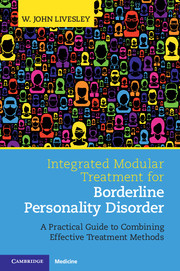 Integrated Modular Treatment for Borderline Personality Disorder
Integrated Modular Treatment for Borderline Personality Disorder Book contents
- Frontmatter
- Dedication
- Contents
- Preface
- Section 1 Introduction and Framework for Understanding Borderline Personality Disorder
- Section 2 Assessment and Treatment Planning
- Section 3 General Treatment Modules
- Section 4 Safety, Containment, and Engagement: The Initial Phase of Treatment
- Section 5 Improving Emotional Regulation and Modulation
- Introduction
- 15 General Principles for Improving Emotional Stability
- 16 Building Emotional Stability: Patient Education Awareness, and Emotion-Regulation Modules
- 17 Improving Emotional Processing
- Section 6 Exploration and Change: Treating Interpersonal Problems
- Section 7 Constructing an Adaptive Sense of Self
- Section 8 Retrospect and Prospect
- References
- Index
17 - Improving Emotional Processing
from Section 5 - Improving Emotional Regulation and Modulation
Published online by Cambridge University Press: 16 February 2017
- Frontmatter
- Dedication
- Contents
- Preface
- Section 1 Introduction and Framework for Understanding Borderline Personality Disorder
- Section 2 Assessment and Treatment Planning
- Section 3 General Treatment Modules
- Section 4 Safety, Containment, and Engagement: The Initial Phase of Treatment
- Section 5 Improving Emotional Regulation and Modulation
- Introduction
- 15 General Principles for Improving Emotional Stability
- 16 Building Emotional Stability: Patient Education Awareness, and Emotion-Regulation Modules
- 17 Improving Emotional Processing
- Section 6 Exploration and Change: Treating Interpersonal Problems
- Section 7 Constructing an Adaptive Sense of Self
- Section 8 Retrospect and Prospect
- References
- Index
Summary
The previous modules sought to improve emotion-regulating skills and strategies. However, skill building alone is not sufficient. It needs to be supplemented by interventions that enhance emotional processing capacity, restore the informational value of emotions, and integrate emotions with other aspects of personality functioning.
The term “enhance emotional processing” requires explanation. What we need to build is a more nuanced activation and expression of emotions by: (i) developing greater flexibility in how emotional events are interpreted and managed; (ii) integrating emotions with other mental processes so that behaviour is more coherent; and (iii) constructing higher-order meaning systems and narratives that integrate emotions with other personality processes and coordinate and regulate the way emotions are expressed.
Work on enhancing emotional processing begins to change therapy in subtle but important ways. First, less-structured interventions are needed both to restructure emotional schemas that are well-established and central parts of belief systems and to help patients to construct new narratives. Consequently, this chapter deals more with principles than specific interventions. Second, since interpersonal factors loom large in triggering emotion and influencing subsequent action, the focus of treatment becomes increasingly interpersonal and the regulation and modulation phase progressively merges with the exploration and change phase, which is primarily concerned with the interpersonal domain.
Enhancing Flexibility in Emotional Responses
The rigidity that is a prominent feature of borderline personality disorder (BPD) extends to the expression and processing of emotions. Emotional expression tends to lack flexibility and subtly is partly due to the intensity of emotions – it is difficult to be flexible when feelings are overwhelming – and partly due to the impact of maladaptive schemas that give rise to fixed ways of thinking about and responding to emotional events.
Promoting the Idea of Emotion as a Process
Rigid emotional reactions are also linked to assumptions that emotions are enduring states as opposed to processes that wax and wane. This assumption is not surprising given the intensity and persistency of emotional states in BPD and patients’ tendency to “fuse” with their emotions and define themselves largely in terms of their current emotional state. It is also maintained by the limited time perspectives of patients who have difficulty integrating events across time and recalling how feelings change with fluctuations in mental state.
- Type
- Chapter
- Information
- Integrated Modular Treatment for Borderline Personality DisorderA Practical Guide to Combining Effective Treatment Methods, pp. 181 - 188Publisher: Cambridge University PressPrint publication year: 2017


